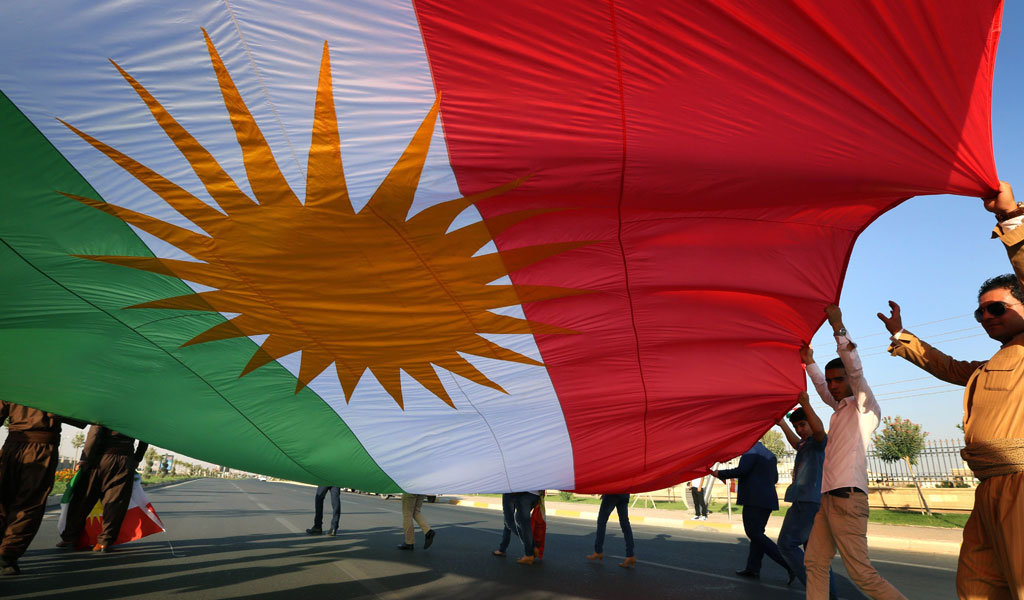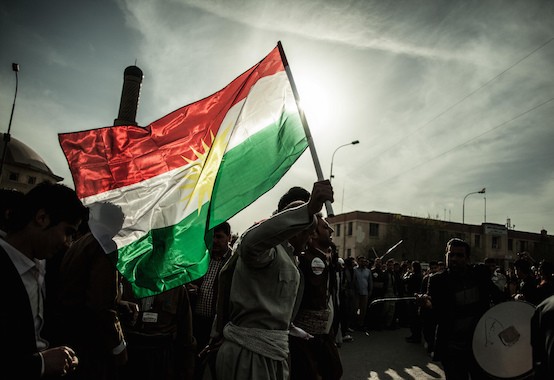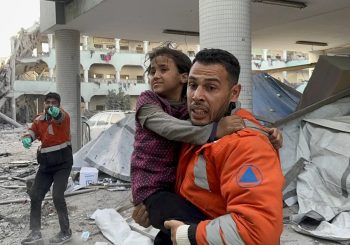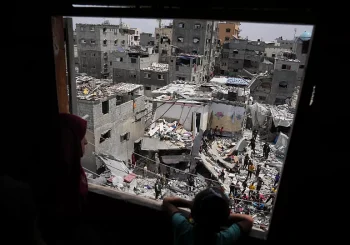
It has been a week since the Kurdistan region of Iraq, despite major protests from regional and global powers, successfully and peacefully conducted its independence referendum. Almost 93 percent of the population, including Armenians, Chaldeans, Assyrians, Yazidis, Kurds, Arabs, Turkmens, voted yes to a free and independent Kurdistan.
Besides the question of what the effects of the referendum will be for the Kurdistan region itself, perhaps more pressing at this point is what the vote will mean for the wider Middle East. Will national borders be redrawn? Are we going to see a new conflict spurred by the Kurdish question? According to regional and international players such as Turkey, Iran, Iraq, the US, UN as well as number of so-called ‘Middle East experts and analysts’ this referendum and a future independent Iraqi Kurdistan will likely have destabilizing effects and lead to a larger regional conflict and civil war in Iraq.
My position, as a Kurd and also as a specialist on security and Middle Eastern studies, is that these claims and statements are unfounded and Kurdish independence will most likely not lead to any serious destabilizing effects.
This is due to a number of interrelated factors, including the current shape of the regional system of power relations. I understand this system as made up of several poles, or players, that compete for power where each one strives to safeguard their security interests. The main players in this system are Turkey, Iran, Saudi Arabia, Israel, the US and Russia alongside a number of non- and sub-state actors like the Kurdistan region. Kurdish independence, if managed wisely by the Kurds, will have positive effects and lead to a more stable regional balance of power.
First of all, Kurdish independence will not lead to any armed conflict between the Kurdistan region and its regional neighbors because the Kurds have not yet officially declared independence. It is highly unlikely that a conflict would break out merely because a population has expressed its opinion about having an independent country of their own.
Secondly, the Kurdistan region has enjoyed official autonomy since 1992 and during the past 25 years, the Kurds in Iraq have clearly shown that they do not pose any threat to the national security of their neighbors. On the contrary, Erbil-Ankara, Erbil-Damascus and Erbil-Tehran have, during this period, enjoyed strong economic, diplomatic and security ties.
Thirdly, as Syria is suffering from a devastating war, we will definitely not see any actions taken by the Damascus regime. Fourthly, except for verbal opposition, Turkey cannot and will not take any irrational actions considering that, since May 2008, the Kurdistan region has arguably become the closest ally of Turkey in the Middle East. Kurdistan, after the UK and Germany, is Turkey’s third largest export market and both sides enjoy strong economic, energy and security cooperation. For instance, through pipelines to Turkey, the Kurdistan region on a daily basis exports more than 600.000 barrels of oil. In addition, a gas pipeline is planned to be built from Kurdistan to Turkey with the supervision of Russia.
Erbil – being the seat of the Kurdistan Regional Government (KRG) – has had a very important role in taming the Kurds in Turkey and many times acted as mediator in the longstanding conflicts between the Turkish state and the Kurdish guerrilla movement PKK. Furthermore, Turkey cannot afford to lose the Kurdistan region as a strategically important export market as well as its only and closest regional ally. The Kurds in Turkey listen to the political leadership in Erbil. Therefore, any hostile action by Turkey would lead to Erbil’s direct interference in Turkey’s domestic affairs through the Kurds there.
Furthermore, the Kurdish Peshmerga forces in Iran, encouraged by the Iraqi Kurds, have decreased their military activities against the Iranian state. As such, Tehran risks a serious conflict breaking out in its own backyard if they make any hostile moves towards the Kurdistan region. Last week, observers of the Kurdish question witnessed how Kurds in Iran (and Syria) poured into the streets to express their support for the independence referendum. The mobilization of so many Kurds at once was so serious that numerous observers believed it could escalate into a full-fledged uprising in Iran. Furthermore, Erbil and Tehran enjoy strong economic and political ties. Therefore, cutting these relations would severely disrupt part of Iran’s border security and economic stability, where more than 15 percent of Iran’s export lands in Kurdistan every year.
Contrary to some observers, The Kurdistan region and its Peshmerga army of 250.000 individuals have demonstrated a strong military effectiveness both following the 2003 US invasion of Iraq but also for the past three years in the war against terrorism as it has been the pillar of the international coalition against the so-called Islamic State. The West, particularly the EU and US depend on the Kurdistan region not only in counter-terrorism and the war against IS but also economically, where more than 21.000 foreign and international companies operate in the Kurdistan region. The Kurds have shown their capacity to safeguard the interests of the West and have shown strong loyalty to them. Therefore, from the perspective of the West, denying the Kurds their right to an independent state would only lead them to embrace Russia and would constitute a direct threat to Western influence and security interests in Iraq, Iran and the Levant.
The Kurds have since 2013 welcomed more than 1.8 million internally displaced persons (IDPs) and refugees from Syria and the rest of Iraq. The Western and regional players are aware that a new conflict involving the Kurds would lead to a serious refugee crisis in Europe, Turkey and the region itself. The Kurdistan region is the only place where Arabs, Turkmens, Kurds, Christians, Persians, Jews, Westerns, Shabaks, Yazidis and Muslims can coexist and live together in peace. Therefore, the Kurdistan region must be praised and awarded for its tolerant, diverse, semi-democratic, pro-Western and multicultural society.
It is surprising that very few have fully understood why the Kurdistan region made the decision to hold a referendum in the first place. Some have said it was because of oil, Kurdish nationalism, the rise of the Islamic state or the 2003 US invasion of Iraq, and such conclusions are relevant and indeed make sense.
However, no one mentions the genocide against the Kurds where 182.000 civilians perished during the Al-Anfal campaign in the late 1980s, which included the chemical attacks in Garmian and Halabja that killed thousands as well as the destruction of 4500 villages. The 1991 mass exodus is also rarely mentioned where more than 1.6 million Kurds fled to Turkey, Iran and Europe. These atrocities were all conducted by Iraq and its military.
Few mention the failure of the post-Saddam Iraqi state, the failure of federalism as a political system, the increased dominance of Iran in decision-making in Bagdad, the sectarian conflicts between Sunni and Shiite Arabs, the capitulation of as many as five Iraqi army divisions when IS entered the country or the chauvinistic and oppressive mentality of successive Iraqi Shiite governments. Bagdad sees this referendum by the Kurdistan region as unconstitutional. However, the Iraqi government has itself failed to implement as many as 55 articles in the federal constitution related to the Kurdistan region. These articles include issues relating to resolving the question of the disputed territories, the cutting of the Kurdistan region’s share of the Iraqi annual budget which includes the salaries of Kurdish public servants, and the blockade of weapons and resources dedicated to Peshmerga soldiers to fight terrorism. Why would the Kurds tolerate these hostile actions? Why would anyone accept to live as a second or third class citizen, which many Kurds feel that they do?
There is a moral obligation here. The international community, especially the US, France, UK and the Islamic world, and amongst them the Arab countries, must recognize the Kurds’ very basic right to self-determination. The principles of brotherhood, human rights, justice and equality would lose their meaning if the Kurds, once again, after a century of atrocities, ethnic cleansing, genocide and oppression, are denied their right to a homeland.
To give those of you who are not Kurds and not citizens of Iraq some food for thought, my question is, if your people lived under the power of another state, would you not wish for independence?






Comment (1)
[…] Error loading HTMLSource: Google News […]